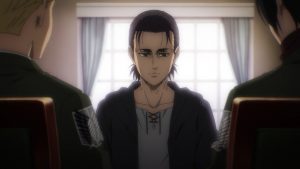 The thought that kept running through my head through these two episodes was “God, I hate all these people.” That makes it easier to think of them all winding up dead, which is a plus, but it doesn’t make getting through the intervening material any more pleasant. I’ve wanted Levi dead almost as hard and as long as Erwin, but I know I’m not getting off that easy. Levi is a much of a cockroach as Erwin was – he’s going to linger on and on (probably till the end, as he’s inexplicably the series’ most popular character).
The thought that kept running through my head through these two episodes was “God, I hate all these people.” That makes it easier to think of them all winding up dead, which is a plus, but it doesn’t make getting through the intervening material any more pleasant. I’ve wanted Levi dead almost as hard and as long as Erwin, but I know I’m not getting off that easy. Levi is a much of a cockroach as Erwin was – he’s going to linger on and on (probably till the end, as he’s inexplicably the series’ most popular character).
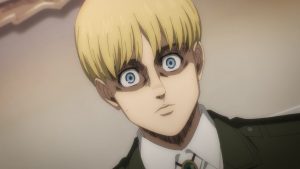 A week’s break from Shingeki (thanks to the most recent Tohoku quake, which thankfully caused relatively minor destruction and injury) might seem like a boon. But it was coming off probably the series’ best episode of the season, and it’s only on watching back-to-back episodes that you realize that 22 minutes of this series is probably the limit. It didn’t help that neither or these eps were as good as that one, either. Rather than the Godfather effect Attack on Titan seems to follow the opposite tack – every time I think I might just be in, it pushes me back out.
A week’s break from Shingeki (thanks to the most recent Tohoku quake, which thankfully caused relatively minor destruction and injury) might seem like a boon. But it was coming off probably the series’ best episode of the season, and it’s only on watching back-to-back episodes that you realize that 22 minutes of this series is probably the limit. It didn’t help that neither or these eps were as good as that one, either. Rather than the Godfather effect Attack on Titan seems to follow the opposite tack – every time I think I might just be in, it pushes me back out.
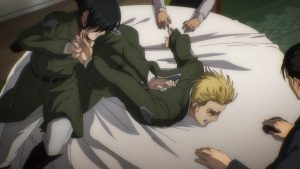 It’s remarkable the degree to which Armin and Mikasa have been reduced to narrative piñatas. I’m used to it with Armin – Isayama loves to humiliate him, though this was extreme even for Armin. But Mikasa was really put in her place by Eren there at the beginning of the episode. She’s basically an android if he’s correct, but the pattern of behavior she’s exhibited over the course of the series does fit the theory. I never liked Mikasa so seeing her laid so low doesn’t really bother me, but the pool of remotely relatable characters at the heart of the story is growing ever-smaller.
It’s remarkable the degree to which Armin and Mikasa have been reduced to narrative piñatas. I’m used to it with Armin – Isayama loves to humiliate him, though this was extreme even for Armin. But Mikasa was really put in her place by Eren there at the beginning of the episode. She’s basically an android if he’s correct, but the pattern of behavior she’s exhibited over the course of the series does fit the theory. I never liked Mikasa so seeing her laid so low doesn’t really bother me, but the pool of remotely relatable characters at the heart of the story is growing ever-smaller.
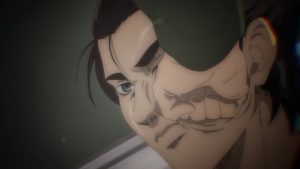 I’m not too nuts about the idea of a Zeke flashback episode right in the middle of the revolution. These frequent flashbacks have a way of disrupting AoT’s narrative flow whenever they happen and they almost always run too long. This one ventured right back into murky allegorical waters, too, an area the series has mostly sailed clear of for the last couple of episodes. Also, one has to ask – how could Isayama do any of this without the narrative crutch of accidental eavesdropping, which he uses over and over to get the plot where he needs it to go?
I’m not too nuts about the idea of a Zeke flashback episode right in the middle of the revolution. These frequent flashbacks have a way of disrupting AoT’s narrative flow whenever they happen and they almost always run too long. This one ventured right back into murky allegorical waters, too, an area the series has mostly sailed clear of for the last couple of episodes. Also, one has to ask – how could Isayama do any of this without the narrative crutch of accidental eavesdropping, which he uses over and over to get the plot where he needs it to go?
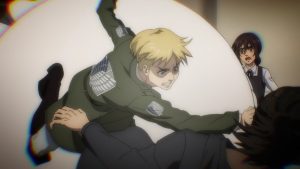 Setting aside the really ugly ideas this final solution plot is trading in (as if one could), I’m not sure the whole Zeke backstory sidebar really added anything we needed to know. Most of this was information that’s dripped out already, and Zeke’s demise has been a foregone conclusion since he arrived back on Paradis soil. As insufferable as Eren is at the moment is there really any reason to want him not to succeed? I don’t see anything here worth saving, but I suppose to a certain extent that’s exactly the point. In a mythology where characters like Eren and Levi outnumber the sympathetic ones by an order of magnitude, total destruction starts to sound like a happy ending.
Setting aside the really ugly ideas this final solution plot is trading in (as if one could), I’m not sure the whole Zeke backstory sidebar really added anything we needed to know. Most of this was information that’s dripped out already, and Zeke’s demise has been a foregone conclusion since he arrived back on Paradis soil. As insufferable as Eren is at the moment is there really any reason to want him not to succeed? I don’t see anything here worth saving, but I suppose to a certain extent that’s exactly the point. In a mythology where characters like Eren and Levi outnumber the sympathetic ones by an order of magnitude, total destruction starts to sound like a happy ending.


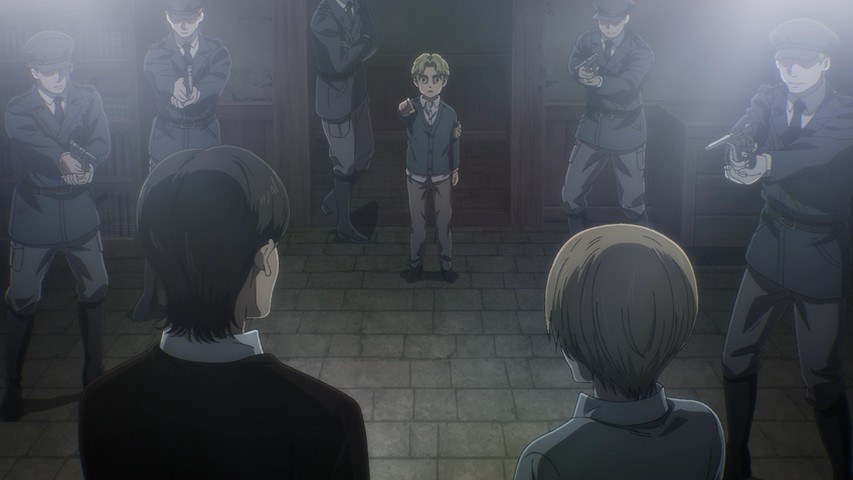
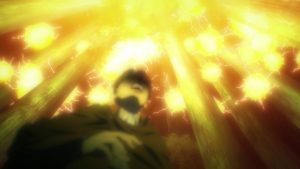
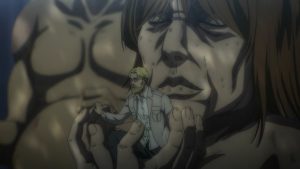
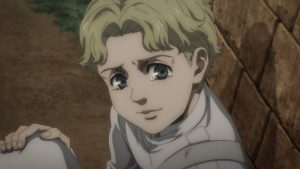
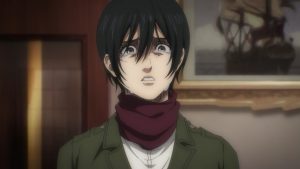
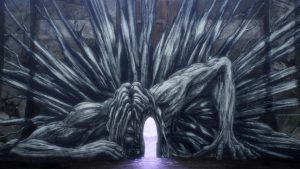
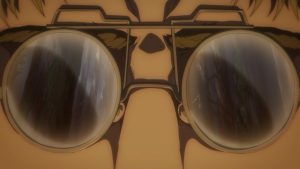
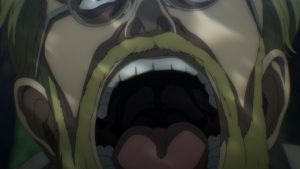
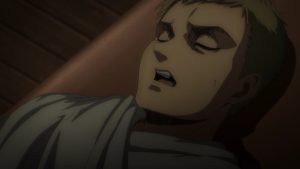
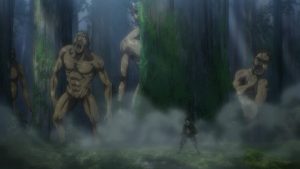


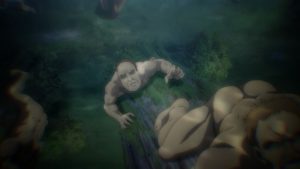
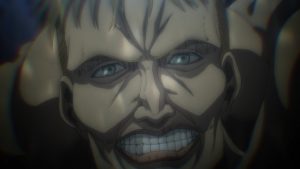
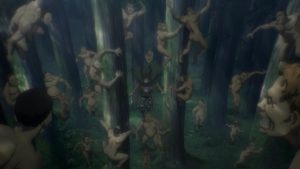
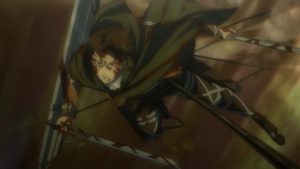
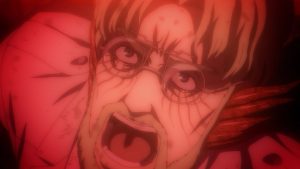
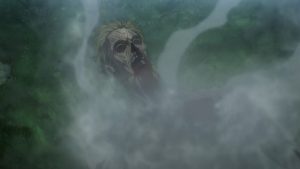
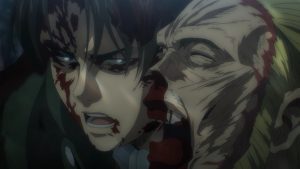
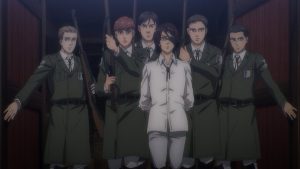
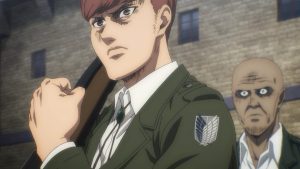
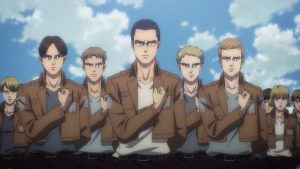
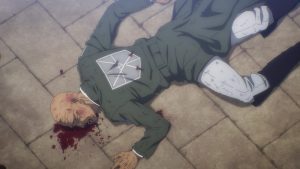
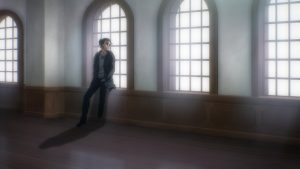

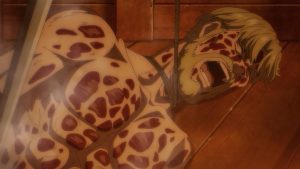

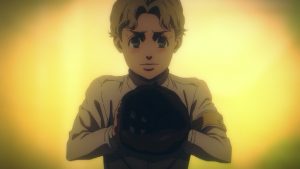
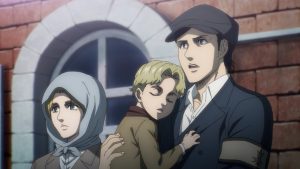
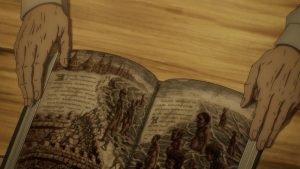
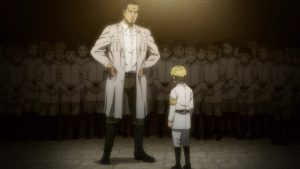
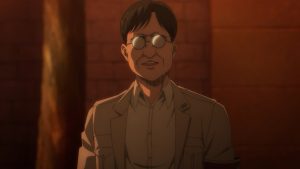
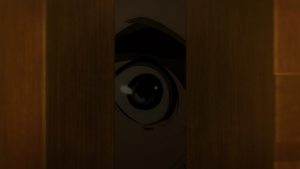
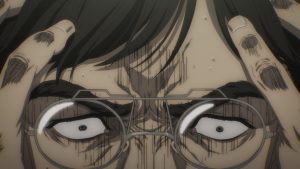
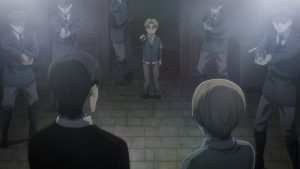
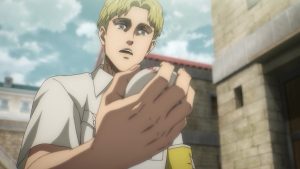
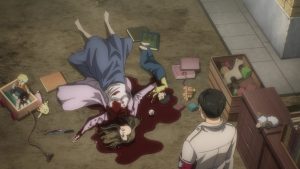
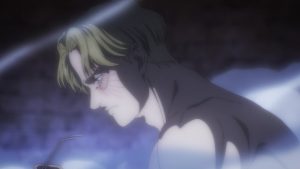
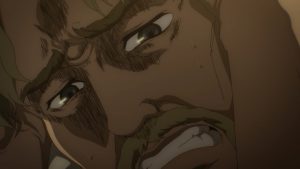
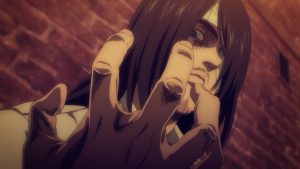
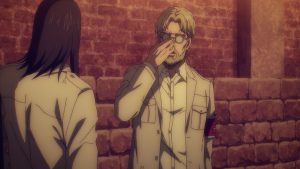
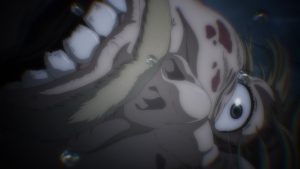
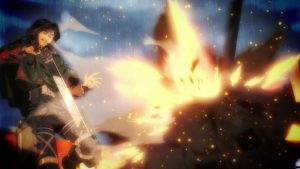
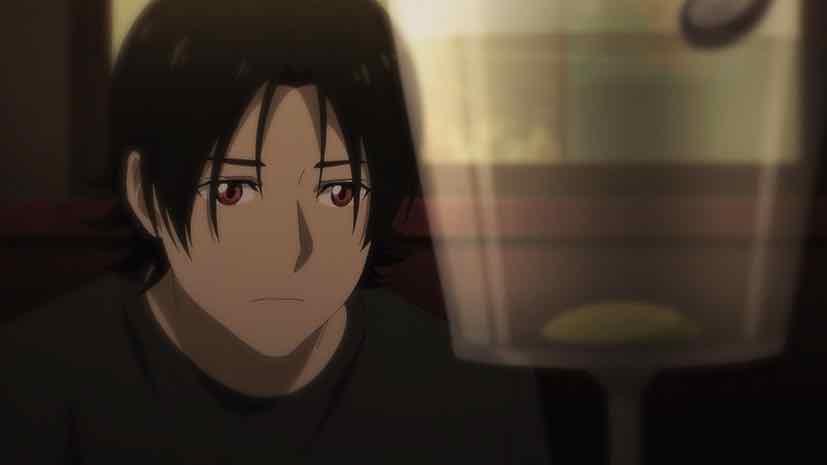
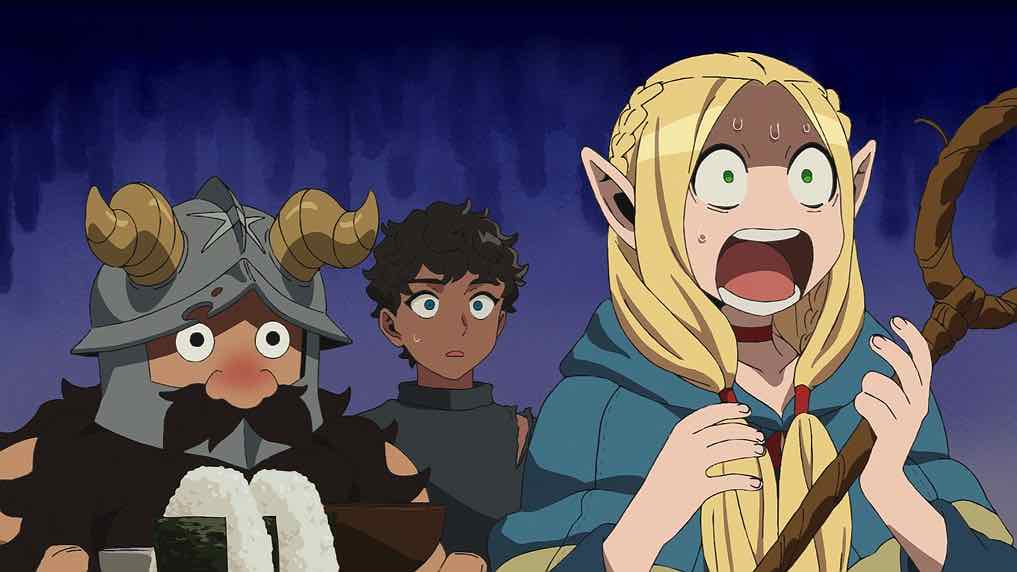
Derrick
March 22, 2021 at 8:42 pmEven in stone age, I don’t think humanity world view is as bleak as this. and they are powerless compared to sabertooth etc.
They just need to be patient and improve technology to better handle any incidents.But I guess a final solution will be future proof
blargnobia
March 23, 2021 at 5:31 amYep. It’s the typical, apocalyptically bleak view of humanity that fascists tend to have. One the one hand, we have Zeke, the self-hating Jew archetype who blames all the world’s problems on himself and his own people. And then we have his foil, Eren: an unapologetic freedom fighter who is “always moving forward” because he was “born into this world.” (Which is a nice way of saying he’s gonna kill anyone who is a threat to his existence.)
The dichotomy is disturbingly on-the-nose, even for Isayama. He’s constructed a world where everyone is a threat to Paradise, so Eren pretty much has to wipe out the rest of humanity. Any nuance or argument for reconciliation becomes a fatal weakness for the Elodians. It’s depressingly similar to Germany’s “we need to expand our territory or we’ll die” argument at the start of WWI.
Cha
March 22, 2021 at 10:58 pmHello. I’ve been reading your snk review. Why do you think season 3 part one was your favourite season? The lack of Titan? More mythical? Some emotional resonance? I’m just wondering because i feel that arc is different from the rest but I can’t pin point how.
Guardian Enzo
March 22, 2021 at 11:04 pmIt’s been a while but as I recall more thoughtful, less absurd, and less allegorical.
ibtachi
March 22, 2021 at 11:48 pmHindsight shows that outside utterly chaotic, bombastic action — internal strife and mystery have been SnK at its best. We got a whole lot of it in S3 (Part One) and a flash of that in the (admittedly stellar) episode 2 weeks ago.
Once either of its strong suits dips its toes in the cesspool of allegories or the themes begin to sway towards Isayama’s brand of “this is why both sides are (were?) bad” storytelling… things get murky.
Cha
March 22, 2021 at 11:32 pmYeah, I like it too I though it was the only arc where there felt was clear themes( no muddy) expressed and I like the relationship between Eren and Historia ties some of those themes . It’s a shame how Eren was once likeable even if it was just for 12 episode. In hindsight do you think AOT should have ended last season? Also why do you hate Levi- is it the stoic character trope?
Guardian Enzo
March 23, 2021 at 7:45 amWell, that would have avoided the whole blood libel fiasco and let the series end on a more dignified note. But in narrative terms I don’t know how that would have worked. What could the series have ended on that would have felt like an ending?
As for Levi it’s a ridiculous character and a ridiculous performance. He’s a sociopath who navigates every situation only because Isayama makes him a superhero. The fact that he considers Erwin a genius and a hero tells you all you need to know above his moral and intellectual state.
Cha
March 23, 2021 at 1:13 pmThe ocean scene would be the ending. Most of the question were answered and there a “ bitter sweet” feel I guess. I’ve seen that mindset come up with people not enjoying this season so I wanted your thoughts
Guardian Enzo
March 23, 2021 at 6:59 pmThat’s an interesting suggestion. That’s possibly my favorite scene in the anime. It’s not really a conclusion but it is rather elegiac.
ibtachi
March 22, 2021 at 11:43 pmSnK’s characters are honestly most fascinating to watch, and easiest to understand, with they’re acting (or rather, reacting) – and I suspect that this unintentional “show, don’t tell” method of character building is a complete accident on Isayama’s part since he thinks it necessary to add flashbacks explaining stuff we already knew. OK maybe we didn’t know every single detail about the plan and his history, but it wasn’t difficult to garner that Zeke had some nihilistic, Final Solution-esque plan in the oven.
Guardian Enzo
March 23, 2021 at 7:44 amPoor choice of words, if apt…
Morg
March 28, 2021 at 6:10 pmIf Makisa really is a slave to her programming and attached herself to Eren because of some kind of genetic predisposition, wouldn’t that imply the same thing happened between Levi and Erwin? Levi is an Ackerman too after all and he once had a talk with her about how they had both experienced that heightened state of knowing what to do or something along those lines. I think it was back in season 3 maybe.
Guardian Enzo
March 28, 2021 at 7:16 pmAnd where does that leave Kenny the mangler or whatever his name was?
FxREEE
April 1, 2021 at 8:46 amRemember Uri Reiss, Historia’s uncle from Season 3’s Kenny flashback? Kenny Ackermann is most likely a slave of Uri Reiss